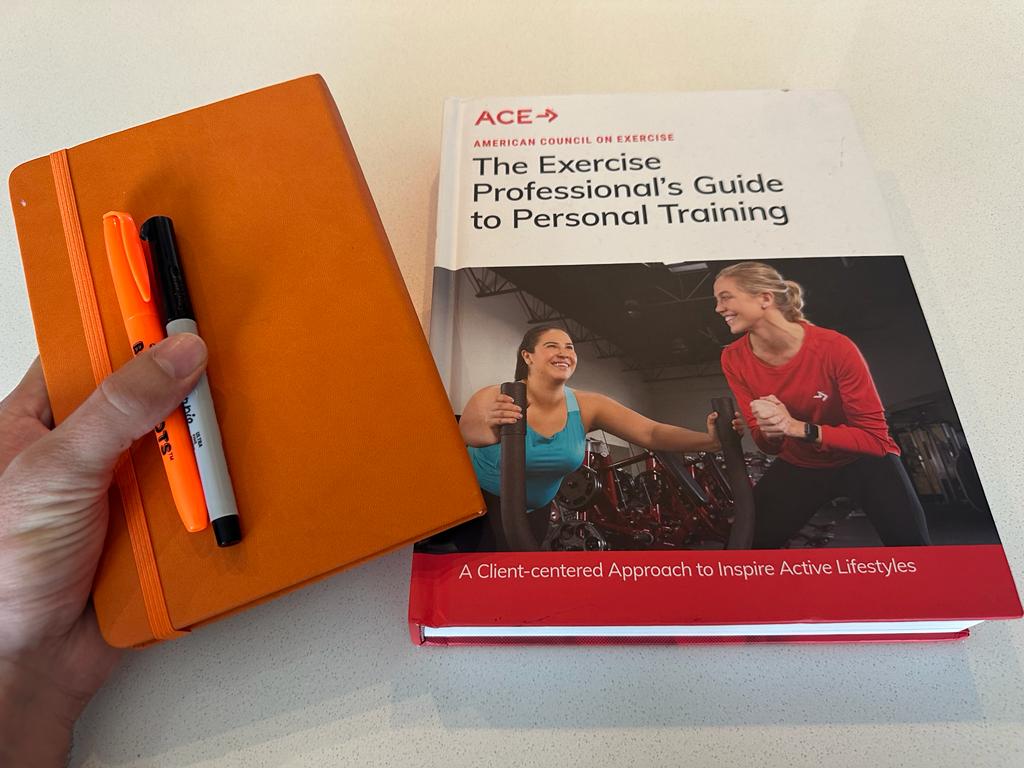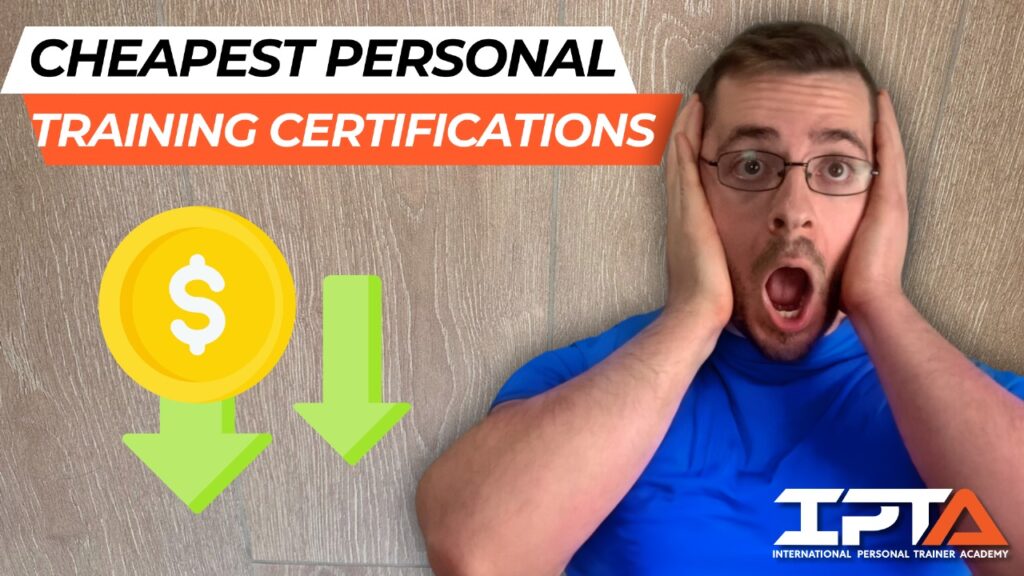
Welcome to the Trainer Academy breakdown of the cheapest personal training certifications.
I’m going to be breaking down the cheapest and best value certifications based on price and overall value based on 8 different value criteria.
Once you finish reading, you’ll be ready to select which CPT makes the most sense for your goals and for your budget.
Let’s do this!
I highly recommend that you take our helpful quiz to find the best personal trainer certification for you based on price.
| Certification | Cheapest Package | Priciest Package | Value Score | Learn More |
|---|---|---|---|---|
| 1. ISSA | $868 | $868 | 10 | Learn more about ISSA CPT |
| 2. IPTA | $399 | $699 | 10 | Learn more about IPTA CPT |
| 3. NASM | $948 | $1,597 | 9 | Learn more about NASM CPT |
| 4. NCSF | $479 | $539 | 9 | Learn more about NCSF CPT |
| 5. ACSM | $735 | $735 | 7 | |
| 6. NSCA | $870 | $870 | 7 | |
| 7. ACE | $587 | $1136 | 6 |
My Criteria for Scoring the Best Cheap Training Certification
I’ve evaluated the top fitness certifications based on 8 key criteria that determine price versus value when choosing a personal training certification, so that you can find the best option for you for the lowest possible price.
A Quick Look at the Cheapest Personal Training Certifications
- Best Packages: ISSA CPT – International Sports Sciences Association
- Best Total Value: IPTA CPT – International Personal Trainer Academy
- Best Premium Study Materials: NASM CPT – National Academy of Sports Medicine
- Most Affordable High-Quality: NCSF CPT – National Council on Strength & Fitness
- Best Mid-Priced Certification: ACE CPT – American Council on Exercise
- Best Low-Cost Alternative: ACSM CPT – American College of Sports Medicine
- Cheapest Exam-Only: NSCA CPT – National Strength and Conditioning Association
Exclusive TA Offers |
||
Most Popular Cert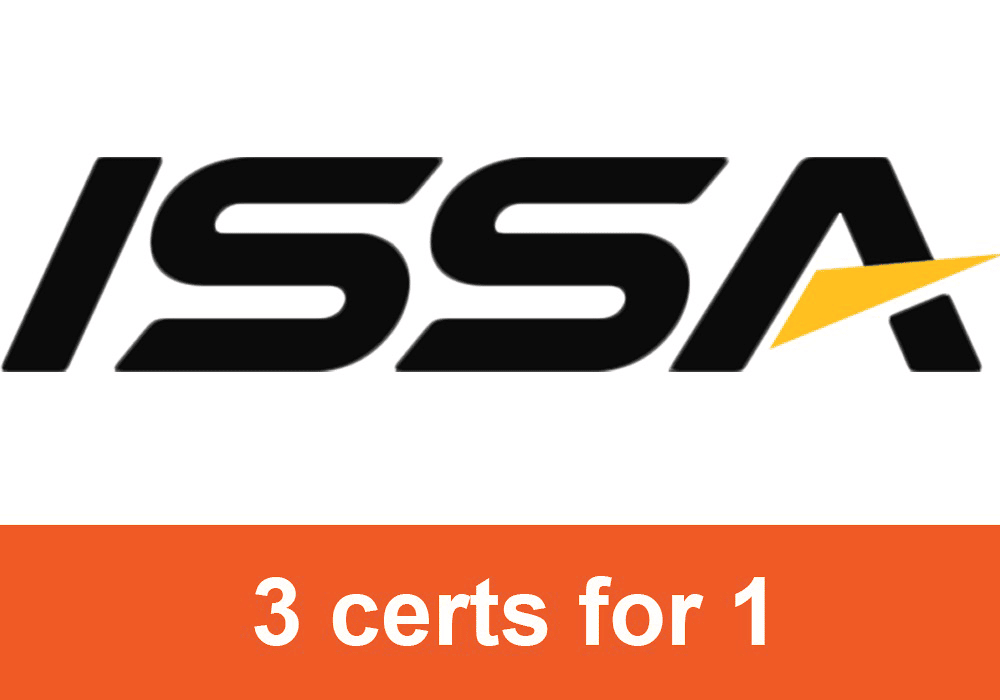
| Great Option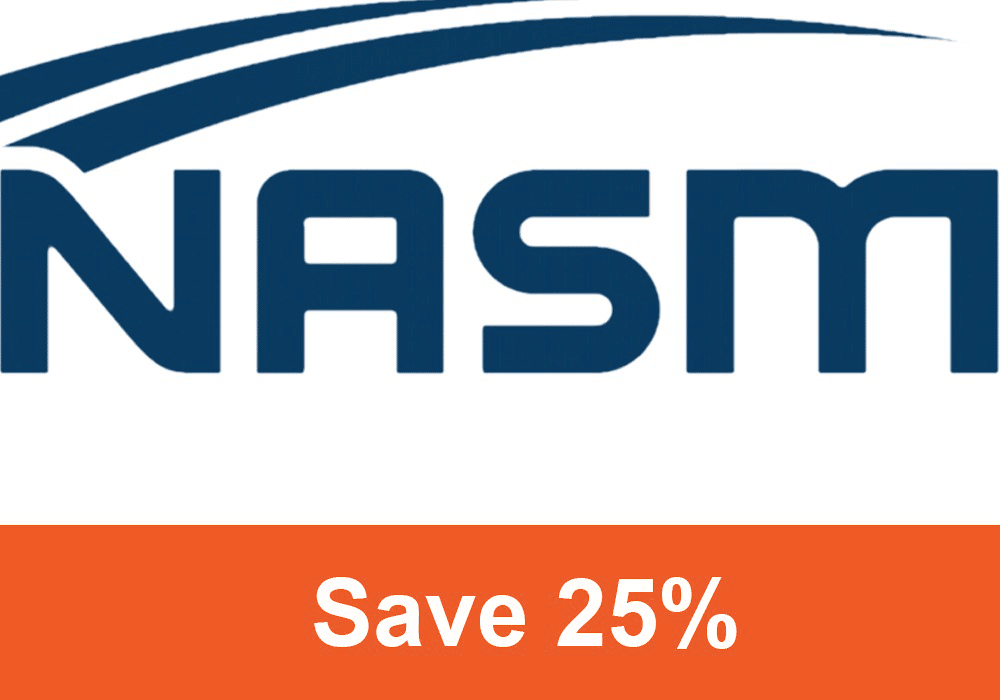
| Best Cert for you? 
|
Good Option
| Good Option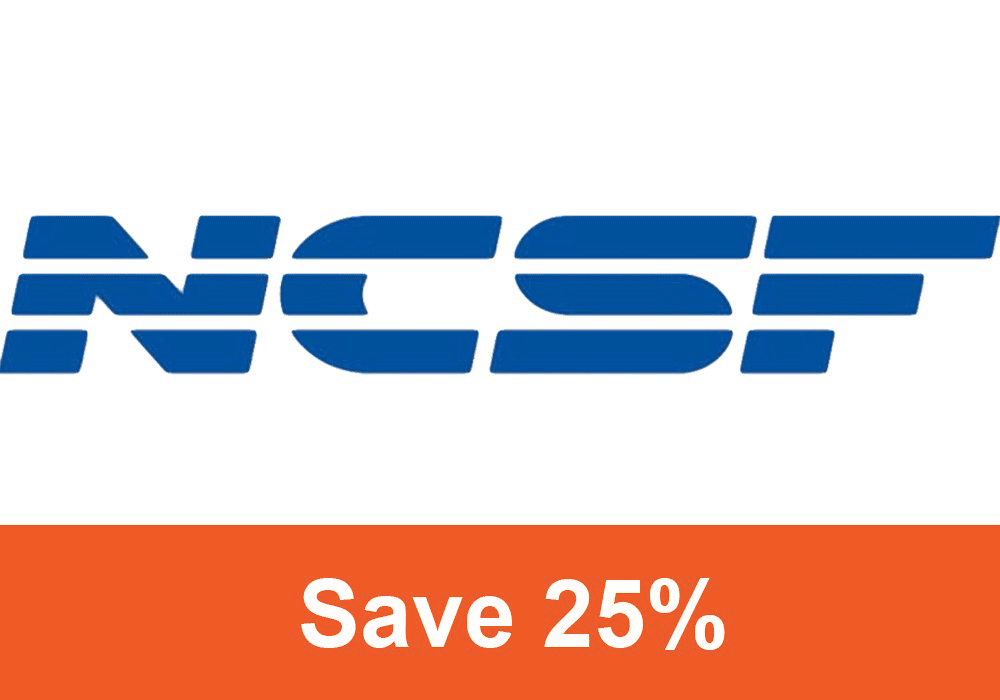
| Good Option
|
Why are we qualified to recommend the top cheapest personal trainer certifications?
The Trainer Academy team comprises personal trainers and coaches with a deep grasp of the current fitness industry. Our staff includes fitness professionals who hold all the major personal training certifications, as well as various advanced degrees in the health and fitness industry.
In addition, we’ve coached pretty much every type of client in every imaginable setting, and we have a thorough understanding of which gyms prefer which certifications.
Our cumulative experience allows members of our team who are expert in specific areas to come together and form a group with expertise that comprehensively spans all corners of the fitness industry.
After examining each certification and helping aspiring personal trainers become certified, we know which certifications come out on top and which certifications actually justify the price.
That is why we’re not only covering the 7 cheapest personal training certifications, but we are only covering the ones that actually offer you a high amount of value. A cheap certification won’t help you if the education is substandard and gyms you’re interested in working at wouldn’t consider it adequate for employment.
Cheapest Personal Trainer Reviews
Best Packages: ISSA
PROS
CONS
Summary: The International Sports Sciences Association (ISSA) is an excellent option that is all online. They have a great reputation for good support services and they offer great package deals with their specialization certifications.
Starting at $994.30
Prices listed are non-promotional, full-price, non-member prices.
ISSA has neither the least expensive study materials nor the least expensive exam, but you get the most value for the money you do spend. You get the full study program, textbook, NCCA or non-NCCA accredited exam (whichever you want).
ISSA also gives you a free website, Job Guarantee, 0% interest financing without a credit check, and if you do your CEU units through ISSA, then your recertification is free.
ISSA offers an Elite Trainer package that gives you training, nutrition, and a third specialization for only $1308, which is only $436 per certification.
Our ISSA review covers the pros and cons of this organization. In short, ISSA has a really good emphasis on exercise programming, periodization, and resistance techniques; however, less time is given in terms of correctional training, which can be important as a health coach or trainer, especially if you are working with clients with previous injuries, which is common when training in the real world.
Many clients you will encounter have some sort of mobility issue, chronic disease, or past injury that will be relevant to the training decisions you make. That being said, it is okay to have your strengths and weaknesses as a personal trainer, especially when starting out.
Not everyone will be good at everything, and that is okay. If the skills that ISSA helps you develop are aligned with the type of trainer you want to be, then it is worthwhile.
Just be honest with yourself and your clients about your own limitations so that you can best support their success. If you become ISSA certified and feel confident optimizing client programming, but encounter a client who needs advanced mobility support that is outside of your expertise, refer them to a trainer who is better suited for that situation.
The ISSA CPT also heavily emphasizes on business skills, which, for a budding fitness instructor, can be integral to your upward mobility in the industry.
Many gyms have upward mobility ceilings, since it can be very difficult to move above the level of fitness director at whichever gym you work at. Understanding the ins and outs of personal training business practices gives you the opportunity to start your own training practice in the future and create your own upward mobility.
ISSA’s coverage on the business aspects of personal training is way more detailed than most of the other organizations, like if you compare NASM vs ISSA on this topic.
ISSA also offfers a buy-one-get-one deal for only $948, which means you get a specialty certification alongside your main personal training one, increasing the net value for your career. It provides which is incredible value and allows you to expand your education to cover important topics like nutrition in more depth.
You can get upgrades to the basic plan that allow you to get even more specialty certifications at once. You can spend $99.97 per month for a buy one, get two deal. They also offer an Elite Trainer bundle, which offers access to four courses on top of the basic personal training, which comes out to $145.80 per month.
The non-NCCA exam is open book and has a 90% pass rate, while the NCCA exam is quite harder with a 65%-70% pass rate. Their online study materials are very easy to access and they have all the lectures available in audio format, which is nice if you prefer to learn on the go.
Every 2 years, 20 hours of continuing education is required to renew your certification.
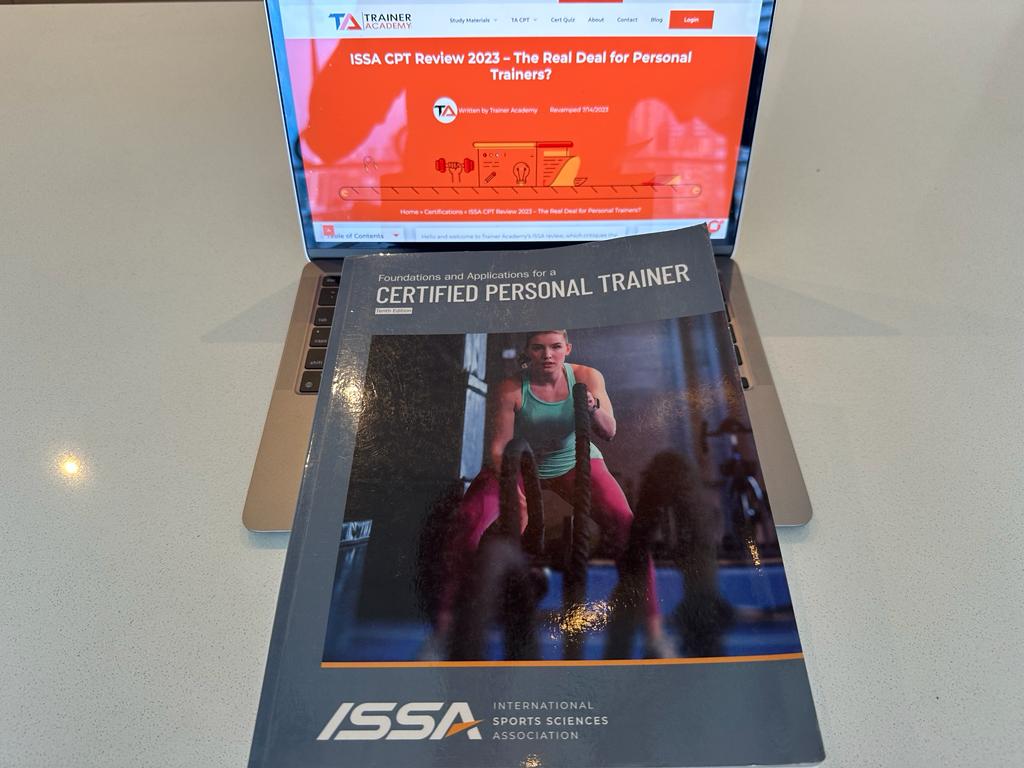
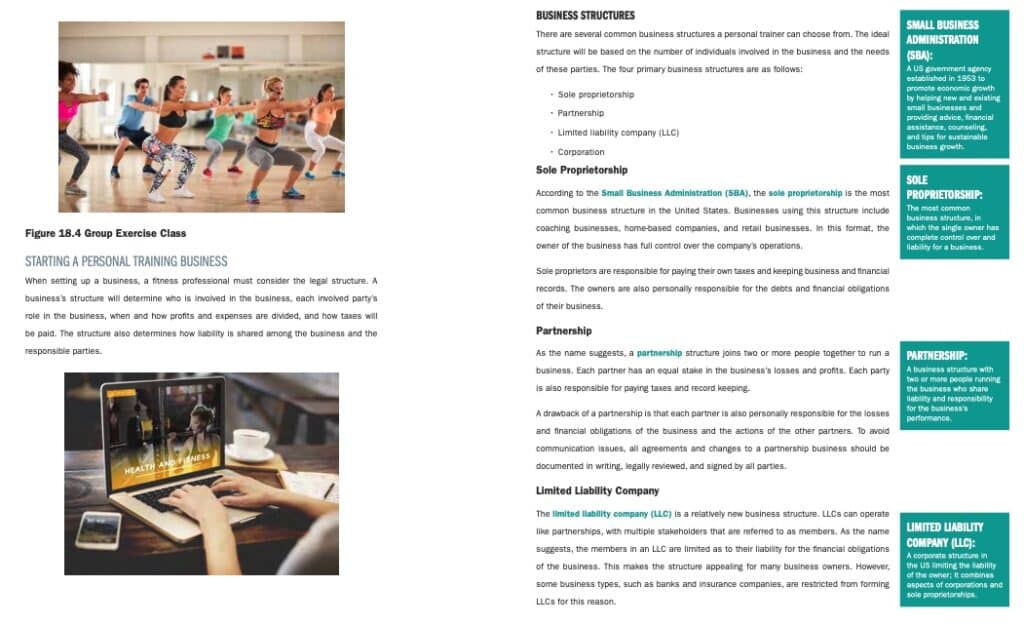
Best Total Value: IPTA
PROS
CONS
Summary: The International Personal Trainer Academy has introduced a cutting-edge NCCA-accredited CPT, incorporating the latest advancements in exercise science.
Quickly gaining recognition as one of the top online certifications, the IPTA CPT stands out with a highly effective study system and exclusive free bonuses that no other certification organization currently offers.
Starting at $399
Prices listed are non-promotional, full-price, non-member prices.
IPTA’s lowest tier, the Rookie, only costs $399, making it the least expensive option on this list. This includes a pdf textbook, the NCCA-accredited exam, and study guide.
But if you spend only a few hundred dollars more, you really get the true value that IPTA offers.
For only $699 with the MVP package you get:
- Exam Simulator
- Flashcard System
- 1 Free Recertification
- Job Guarantee
- Unlimited exam retakes
- SurePass AI
- Audio Study Guide
- Performance reporting
- Streaks
- Study gamification
- Weak point training
- Tailored study plans
- Magic mnemonics
- Exam date tracker
- 0% Interest financing.
No other organization comes even close to the amount of value you get for the price with IPTA. The main negative with this certification is that it’s the newest one on the list and hasn’t reached the wide appeal of ISSA or NASM yet.
Unlike conventional certifications that depend on old-fashioned textbooks and rigid study routines, IPTA takes a modern approach with AI-driven adaptive learning and research-backed study strategies. This innovative system helps you learn faster, reducing study time by up to 50% so you can start working with clients in just weeks.
What truly sets IPTA apart is its dedication to making education both affordable and accessible. They provide their entire textbook at no cost and offer a risk-free trial of their study platform—no credit card required. This means aspiring trainers can explore the program with complete confidence before making a commitment.
The Trainer Academy CPT Textbook presents key topics, including anatomy, physiology, biomechanics, training methodologies, and professional guidelines, ensuring that aspiring fitness professionals gain a well-rounded education.
With 30 chapters, it progresses from core physiological systems to complex training strategies, such as periodization, corrective exercise, and training for special populations, making it an essential guide for CPT certification preparation.
One of its standout strengths is its structured, scientific approach. The textbook builds knowledge progressively, starting with anatomy and physiology before moving into practical applications like movement assessments and program design.
Each chapter is backed by credible research, offering detailed insights into resistance training, plyometrics, speed and agility training, and corrective exercise. The assessment sections provide thorough guidance on evaluating client movement patterns, mobility, and stability, equipping trainers with the skills to tailor programs effectively.
Beyond training methodologies, the book covers essential professional considerations, including legal and ethical guidelines, nutrition fundamentals, and special population training.
The dedicated chapters on macronutrients, micronutrients, hydration, and supplementation ensure trainers understand performance fueling while staying within their professional scope.
Additionally, the inclusion of industry standards, liability considerations, and ethical practices helps trainers navigate their careers responsibly.
The IPTA Personal Training Certification is NCCA accredited. This means you must take a closed-notes, proctored exam, which you can do at a testing center or online at home.
You need to renew your certification every 2 years with 24 CEUs.
Best Premium Study Materials: NASM
PROS
CONS
Summary: NASM (The National Academy of Sports Medicine) is one of the most well regarded certification programs. One of its highlights is its strong corrective exercise base.
Starting at $899
Prices listed are non-promotional, full-price, non-member prices.
NASM is the most popular certification provider and with good reason. While, just like ISSA, their lowest tier is more expensive than others on this list, they offer a lot for the price.
With their lowest package, the Self-Study, you get:
- the NCCA-accredited or non NCCA-accredited exam
- the textbook
- study program
- practice exam
- quizzes
- knowledge prep
- access to NASM Edge App.
The NASM online study program is one of the best and easiest to use after IPTA, and their online exercise library is the largest of any certification provider. NASM also has the best instructional videos of any certification.
We at Trainer Academy agree in our NASM review that the National Academy of Sports Medicine is an excellent choice and covers most of the material needed for new personal trainers, using exercise science principles you can use to help your clients get great results in their training sessions.
NASM prioritizes evidence based practice and as such is very effective at keeping its recommendations in line with recent science.
They use the OPT model (Optimum Performance Training) model for program design and exercise prescription, which is what they are usually most well known for.
This model isn’t necessarily different from other personal training models of exercise programming and prescription.
It’s just that the OPT model is a specific version of programming that NASM endorses. Many other certification programs out there will present you with a very open ended prescription model, which can be hard for new trainers to effectively make sense of and use. N
NASM goes with a more narrow approach so that there is less room for error when you start practicing. This will serve to make you more effective early in your career, since you will avoid some of the programming mistakes that other new trainers make. The OPT model specifically takes you through a comprehensive and progressive training program that covers stabilization, strength endurance, hypertrophy, maximal strength, and power.
Additionally, NASM includes special population and behavioral instruction, along with basic business skills you might need in your career. These are all points that major certifying bodies touch on in some way. But it is important to note that NASM covers each of these areas adequately, and doesn’t allow one to severely lag behind the others. As a result, it is a pretty well rounded certification.
Similar to most other personal training certifications out there, the NASM personal trainer certification does not cover nutrition in much depth, unless you are specifically getting their NASM Nutrition Certification.
This is because nutrition is often considered tangential to personal training practice, rather than an active part of it. It’s important for personal trainers to be able to accurately respond to client questions about nutrition, but personal trainers should always refer clients to the appropriate dietetics professionals when clients need nutritional support outside of the personal trainer’s scope of practice. I
If you decide to get NASM’s Nutrition Certification, you will expand your scope of practice a bit, allowing you to help clients with nutrition more than you otherwise would have been able to.
The biggest downside to NASM is that their OPT model is narrow, contrasted to the open ended approach of other organizations. As mentioned earlier, this is a strength in some ways. But it also is a downside, since it can be hard to adapt the model when you become a more advanced trainer. Being able to problem solve program design needs in an open ended way sets you up to make nuanced and well informed programming decisions later in your career. This can be a bit harder with the OPT model.
Their courses cost anywhere between $899 for the basic study package up to $2,399.
The exact pricing of these courses may vary depending on whatever deals are available at the time, but he’s a breakdown of the different options they provide:
Self Study ($899)
Premium Self Study ($1,179)
CPT Essentials Bundle ($1,449)
Elite Trainer Bundle ($2,399)
Although the NASM exam by itself isn’t the cheapest optionmost inexpensive, NASM does have some tempting packages that include multiple certifications. When this is factored in, the overall cost per certification is pretty low when contrasted to other personal training certification bundles on the market.
A specialization certification is a great bonus to add on to a CPT cert as it will enable you to work with different populations more effectively (children, groups, athletes, etc.). It can also prepare you to support exercise in different formats, like group training. Although these are all things you are somewhat prepared to do by becoming certified as a personal trainer alone, you can always improve. The better you get, the better you will help your clients achieve their goals. And, the more career opportunities you will have.
It directly gives you more job opportunities, higher earning potential immediately, and it separates you from other trainers out there.
Many gyms will offer you a slightly higher session payment split if you come in with extra certifications. Earning an extra few dollars per session will really add up when you look at it over the course of one or more years.
The nice thing about specialty certifications is that once you get them, you have them for life, with no need to do anything special to get recertified – so long as you continue to upkeep your main personal training certification. So your net gain from the certifications will only increase year after year, given the lack of upkeep cost.
NASM is currently running a deal, the Elite Trainer bundle, which includes 4 different certifications at a much reduced rateof $2,399 for all certifications.
This could be perfect for anyone looking for that extra gear to propel them forward in the fitness industry so go NASM’s website to see if it’s still available.
The exam pass rate is 60% for first time test takers, which can look daunting to some. If you’re serious about doing well on this one, make sure to study for at least a few months and master a NASM practice test because the retest fees are expensive as well ($199).
After you pass your exam, the certification is valid for 2 years. During that time you have to complete at least 2.0 continuing education credits along with a $99 recertification fee if you want to hold onto your certification. Which we always highly recommend. After all of the hard work that you put into getting certified, it’s best to take action to maintain your certification so that you can continue practicing as a credentialed personal trainer.
Most Affordable High-Quality: NCSF
PROS
CONS
Summary: The National Council on Strength and Fitness (NCSF) is a less well known organization. It is both a community-driven health initiative from South Florida and a certifying agency, helping the National Commission of Certifying Agencies (NCCA) accredited credentialing programs and advocating for fitness professionals around the globe.
Starting at $479
Prices listed are non-promotional, full-price, non-member prices.
NCSF offers the second-cheapest exam plus study materials after IPTA at $479.
This includes:
- the NCCA-accredited exam
- textbook pdf
- instructional videos
- Q and A
- review quizzes
- instructor support
- 1 free year of NCSF membership
- payment plan option
For $539 you get everything above plus a hard copy of the textbook
NCSF does a fine job of laying out the basic exercise science, biomechanics, health behavior, exercise programming, coaching, and exercise techniques needed as a personal trainer. The quality of education it offers isn’t as strong as other options like IPTA, the NSCA, or NASM. But it does offer enough to get by as a personal trainer at an affordable cost. But that’s not all.
The NCSF certification presents a lot of the information in a very accessible way.
Our NCSF review highlights how the information is laid out in a really clear, easy-to-understand format, especially the exercise coaching instructions. Naturally, coaching is one of the cores of personal training practice. This can be helpful for you if you’re coming into the certification process with little to no real world experience working with people during exercise.
It’s also worth noting that we find the NCSF The main thing lacking in business skills coverage. It doesn’t comprehensively cover things like sales, which are a huge part of the practical applications needed as a personal trainer at most locations.
If you’re working in a standard commercial gym, like an LA Fitness, then sales will be a big part of your job. If you work at a private trainers-only gym, or upper-end gym, then it could go either way. Some upper end and private gyms have a staff member dedicated to member management and sales, so the trainers can focus on personal training exclusively. But this is pretty rare. In most cases you’ll be involved in sales in some fashion, and it will become a part of your day to day.
If you are starting out on your own or even working for the average gym, knowing how to both attract clients and manage your current clientele is a very valuable skill. It also makes your job a lot easier. Most people who do personal training don’t particularly enjoy sales. But, they have to do it anyway.
If you’re really good at gaining and maintaining clients, then you won’t have to deal with the sales component of the job very often. It only comes into play when you have a need for new clients. Getting better at it up front can really save you a lot of trouble in the long run.
The only other major downside with this certification is that they are not as big a name in the fitness industry as some of the other certifications listed below.
They are NCCA accredited, which is the gold standard of quality, but they are just not a huge household name. It’s also important to keep in mind that NCCA accreditation just means a certification met a minimum standard. Some certifying bodies like the NSCA and ACSM, among others, go far above the minimum standard.
For instance, every year, their CPT exam is attempted approximately 2,455 times versus an organization like NASM where their personal trainer exam is attempted 22,000 times. This can come into play when you’re applying for a new job. The hiring manager might just go with another candidate who has a more well known personal training certification.
The Certified Personal Trainer (CPT) exam by itself will cost $349. Their study packages at the time of this article are between $479 and $699, which is extremely reasonable compared to other certifications.
Home Study ($479)
Home Study+ ($539)
CPT + SNS (Sports Nutrition Specialist) ($649)
CPT + CSC (Certified Strength Coach) ($699)
The NCSF CPT exam has a 78% pass rate, which makes it one of the easier certification exams to pass.
If you want to do their Home Study program, the only difference between the Home Study and Home Study+ package is that the plus contains a physical textbook along with the digital copy, so if you don’t mind going digital, save the $60 and get the Home Study package. Most modern candidates find they prefer digital anyway.
The online study materials they offer are pretty standard so there is nothing too special there, but their materials are straightforward and easy to use. They have flashcards, lesson notes, and two practice exams you can take.
NCSF requires 10 CEUS every two years, which is roughly 20 contact hours, similar to other certifications like ACE or NASM.
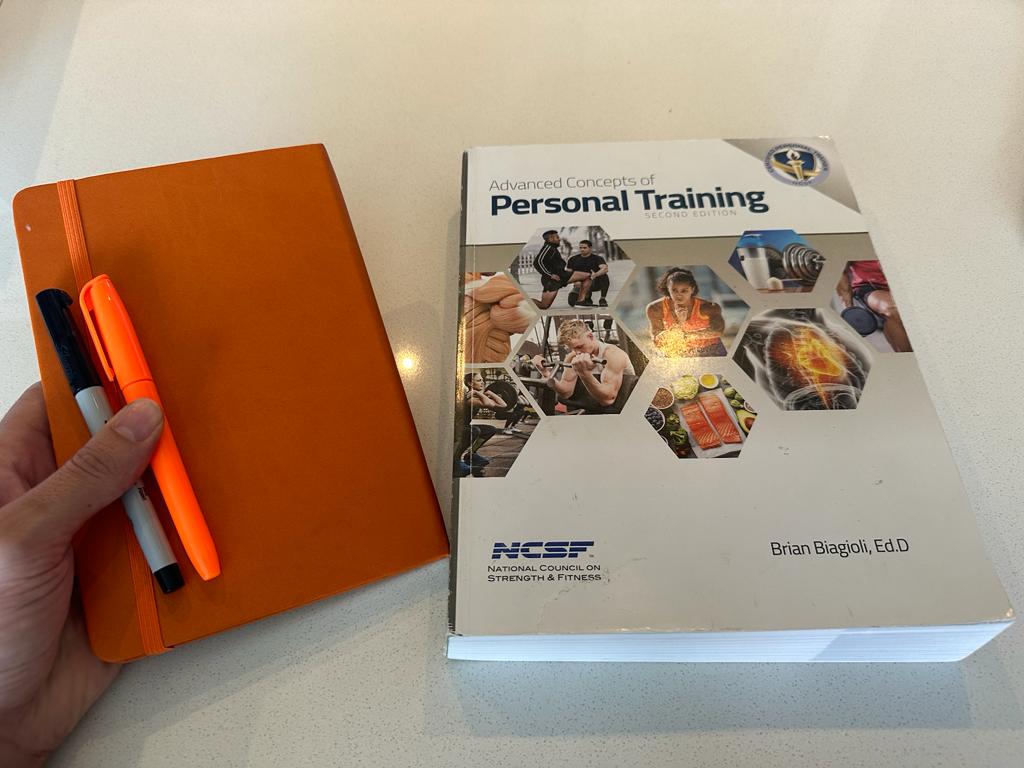

Best Low-Cost Alternative: ACSM
PROS
CONS
Summary: The American College of Sports Medicine (ACSM) is the oldest personal trainer certification, and it has deep roots in promoting and conducting clinical sports research.
Starting at $399
Prices listed are non-promotional, full-price, non-member prices.
0T he ACSM is not only a well known and highly reputable personal trainer certifying body, they also double as an institution that supports academic research and innovation in the field of exercise science. The decisions made in terms of what to include and what to emphasize stem from their background in research.
Because of the American College of Sports Medicine’s emphasis on research, there is a lot of detail in the information covered on health screening clients and physical fitness testing. This is emphasized by the ACSM because making data driven decisions in practice requires being informed about the state of your clients in a quantitative way.
If you are able to accurately use fitness testing methods to evaluate your client’s physical fitness and abilities, you can match that to the most effective solution in a 1 to 1 way. This more methodical approach to exercise prescription and program design decisions has its strengths, in that it is able to improve health outcomes for clients better than most other approaches. This sets up ACSM certified personal trainers to excel at work with special populations and individuals dealing with different chronic diseases and conditions.
However, the ACSM does fall short in the sense that it tends to focus on one narrow need of a client and effectively resolve that. It isn’t as well geared for addressing a large array of different client needs at once.
On the soft coaching skills side, the ACSM also covers behavior change science very well.
In terms of cons for our ACSM review, there isn’t much emphasis on actual exercise technique, which is a major downside overall. Understanding how modifying the way your clients perform an exercise influences the way their bodies adapt to your exercise programming is an integral part of effective training.
The ACSM is also a bit lacking in the program design department, which is because their approach is more sterile. You will still be able to design training programs well enough, but won’t have as much education about how making nuanced programming decisions will influence training outcomes related to key common client goals like muscle building or fat loss. This happens in exchange for learning exactly what to prescribe in response to outcomes on specific diagnostic and evaluative tests.
Also, some of the information is presented in a very dense manner, which might be a little challenging to unpack for personal trainers without prior experience taking college courses in a health related field.
Overall, this fitness certification would probably be best for anyone who is more interested in client evaluation and taking a methodical and highly regimented approach to exercise prescription. Although this will not prepare you to work in a hospital as an exercise physiologist, it can be helpful if you plan to eventually become an exercise physiologist later in your career.
The ACSM is also responsible for producing EP-C and CEP certifications, which are the most desired ones for exercise physiologist jobs in hospital settings. Getting an ACSM CPT will make it easier for you to learn the material for the exercise physiologist certification exam down the line if you decide to go that route.
It can also help to develop a relationship with the ACSM if you plan to pursue a Master’s or Doctoral degree in the field in the future and want to eventually be involved in research. Although any researcher can present their research at an ACSM conference, getting involved with the organization early and building connections there can help you in your career down the road.
If you are looking for ACSM CPT exam info, here are the current rates, which are subject to change. The ACSM CPT exam costs $399 without a ACSM membership and $299 if you are a Member Candidate. The membership costs $20 for the first year if you are a student and $99 or greater depending on what level membership you want for anyone else.
They also have an online ACSM course which costs $270. It will also cost $199 to retake the exam if you fail your first time around. But you can reduce the odds of this happening by taking advantage of all of our personal trainer certification prep resources here at Trainer Academy.
The ACSM exam has a 69% pass rate. That rate is slightly easier if you compare ACSM vs ACE, and much easier than NASM if you look at NASM vs ACSM. The organization does not provide too many of their own study material besides the textbook so make sure to check out a good ACSM study guide and ACSM practice test.
Every 3 years you are required to recertify, with 45 continuing education hours, which is quite a lot.
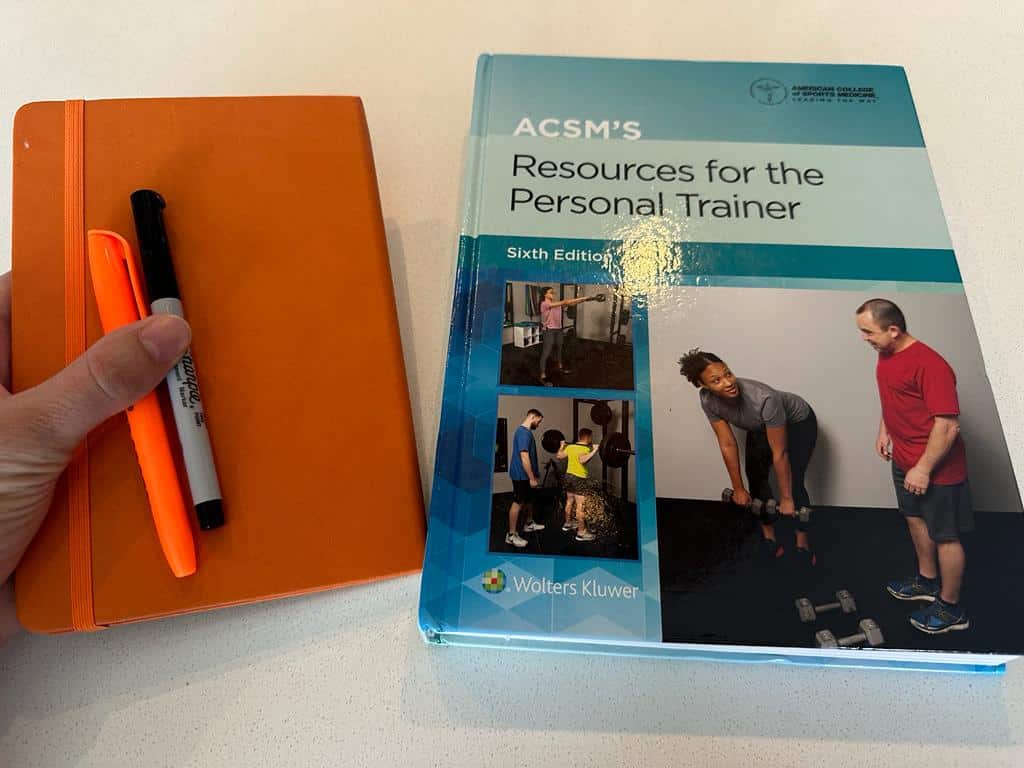

Cheapest Exam-Only: NSCA
PROS
CONS
Summary: The National Strength and Conditioning Association was the first organization to be approved by the NCCA (National Commission for Certifying Agencies). It has a great focus on strength and conditioning and is a global leader in research, practical application, continuing education and strength and conditioning coach networking.
Starting at $435
Prices listed are non-promotional, full-price, non-member prices.
Here’s a brief NSCA CPT review. The NSCA covers plenty of important topics for personal trainers such as strength training, coaching, and working with special populations among others. It covers all the bases you’d expect a high quality CPT exam to cover, but there is a lot of information to digest for someone preparing for their personal trainer exam and become certified as a personal trainer for the very first time. It can be a lot of information to take in at once, but if you are able to take it all in, the NSCA CPT is extremely useful.
It will prepare you to be a much more effective trainer than many of the other certifications on the market because you will have a much stronger foundation in all areas of personal training. It allows you to make informed creative training decisions on your own more easily, rather than repeating a narrow set of recommendations. It can really help prepare you for higher level training later in your career, such as work with athletes.
Many candidates find they have trouble with some of the more technical sections, like biomechanics, so it can be especially useful to prepare for sections like this in advance by taking advantage of all test prep materials available to you. Biomechanics can be complicated and is helpful for problem-solving on the fly. Misunderstanding its principles can lead to making plenty of training mistakes without ever realizing you’re making them.
However, the program design and periodization information NSCA includes is among the best you will find in a CPT certification and will definitely give you the tools to help your training clients improve their performance and physique. It can be challenging to wrap your head around at first if you’re new to the fitness industry, but with enough time it’ll be worth it.
The only thing lacking in the NSCA CPT certification is that while it teaches you the fundamentals of training clients, there is minimal information on how to grow your Personal Trainer business and go out and find those clients.
Don’t worry, though. If you aren’t able to learn about how to effectively build a personal training business through the NSCA CPT and want to do so in the future, you can always take advantage of our online resources to better understand the personal training industry and how to find your place in it as an up and coming professional fitness trainer.
If you decide you want to pursue specifically training athletes, the NSCA CSCS (Certified Strength & Conditioning Specialist) is one of the most respected strength and conditioning certifications out there and is well worth your while, although it is a very challenging test so make sure to pick up a CSCS study guide and a CSCS practice test.
The CSCS would require that you have a minimum of a bachelor’s degree and has a very low pass rate. Many candidates with bachelor’s degrees in fitness related areas, such as Kinesiology, do not pass the CSCS on their first attempt due to its difficulty. By 2030, the CSCS will only allow candidates with a bachelor’s degree in an exercise related field to sit for the test.
So if you are someone interested in getting the CSCS and working with athletes, but never went to college for Exercise Science, then the clock is ticking. Study for and take the NSCA CSCS exam before you miss your opportunity to do so.
The CPT exam by itself costs $435 as a non-member and $300 if you join the NSCA. You can also join the NSCA as an official NSCA member if you’d like additional perks. Prices to join the NSCA are $70 per year as a Student, $130 per year as a Professional, and $209.42 per half year for the CPI membership, which includes liability coverage and many other perks.
Joining as a member gives you access to the NSCA’s recurring research journal, which will provide you with direct access to breaking research in strength and conditioning. The NSCA, similar to the ACSM, is very much steeped in academic research. Many esteemed researchers aim to have their research published in journals with impact factors like the NSCA’s Journal of Strength & Conditioning Research. It is one of the flagship journals for the science of strength and conditioning in exercise science.
The certification exam pass rate is 72%, which is a bit easier than some of the other organizations covered for a personal trainer test.
Every 3 years you are required to do 6.0 CEUS to hold on to your certification, which equates to 60 contact hours.
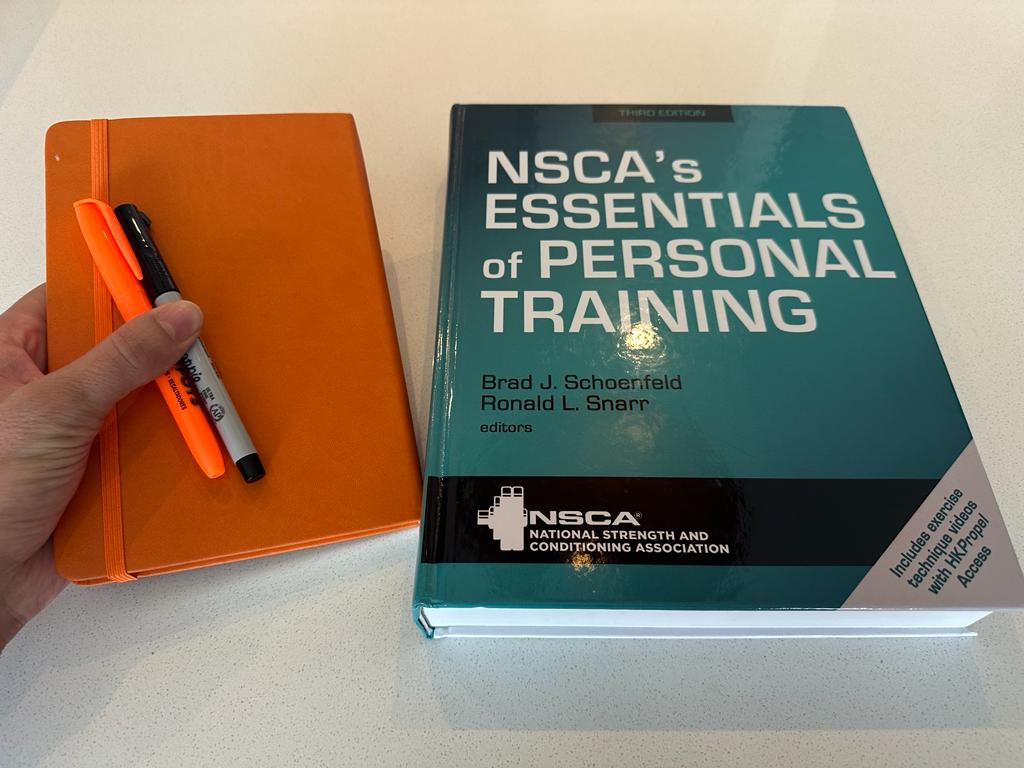

Best Mid-Priced Certification: ACE
PROS
CONS
Summary: The American Council on Exercise (ACE) is one of the most popular, recognized names on the list. It’s accepted in North America and parts of Europe
Starting at $587.50
Prices listed are non-promotional, full-price, non-member prices.
Our ACE CPT review agrees that ACE does a great job at teaching the basic skills and concepts necessary for personal training. ACE is a great starter certification to get your foot in the door in the industry. It also focuses on soft coaching skills over more technical science, which makes it really useful for trainers who seek to work with clients who are newer to exercise and may struggle with motivation.
ACE uses the Integrated Fitness Model (ACE IFT) as the framework that ACE bases its recommendations for personal training practice around. Similar to other certifying bodies like the NSCA, ACE also has an excellent library of exercise videos, complete with descriptions.
Their coverage of behavior change and exercise psychology is really top tier. It is really well detailed and will serve you well as a personal trainer.
This is a great option for trainers who are newer and are looking for a good base of knowledge to build off of.
The main downside of this certification is that ACE, like the NSCA, doesn’t provide too many sales resources for trainers looking to learn about how to grow their personal training business.
ACE also has an excellent certification for Group Fitness Instructors, so if you think you might want to exclusively teach fitness classes, you can take that certification exam along with their Basic package for as little as an additional $167.50.
Here’s the ACE CPT exam info based on current prices. The American Council on Exercise CPT (certified personal trainer) exam only costs $425.
Currently, the study packages range from $425 to $587.50.
Basic ($425)
Plus ($472.50)
Advantage ($587.50)
The ACE exam has about a 65% pass rate, making it kind of in the middle in terms of difficulty. The study materials in their packages are very thorough, and their online website portal is probably the easiest to operate of all the certification organizations, but the highest tier is definitely priced higher than most people will need for the information provided to pass their certification exam. You may want to add in an additional ACE study guide and an ACE practice exam if you want as much help as possible before you attempt the exam. It’s always good to be prepared.
ACE requires 2.0 continuing education credits every two years, which equates to 20 hours of contact.
Exclusive TA Offers |
||
Most Popular Cert
| Great Option
| Best Cert for you? 
|
Good Option
| Good Option
| Good Option
|
Exclusive TA Offers |
||
Most Popular Cert
| Great Option
| Best Cert for you? 
|
Good Option
| Good Option
| Good Option
|
Where Does Each Certification Score on our Key Criteria?
Certification Price
When it comes to just buying the certification by itself, IPTA, NSCA, and ACSM are the clear winners, with NCSF a close second.
IPTA wins out because for almost the same price you also get the textbook and a study guide, whereas NSCA and ACSM make you buy that separately.
| Certification | Price |
|---|---|
| 1. IPTA | $399 |
| 2. ACSM | $410 ($310 if you are a ACSM member) |
| 3. NSCA | $435 ($300 if you are a NSCA Member) |
| 4. NCSF | $479 |
| 5. ACE | $587 |
| 6. ISSA | $868 |
| 7. NASM | $948 |
Study Material Price
IPTA and NCSF are the cheapest options if you want the most inexpensive study materials.
IPTA gives you 3 package options, but even the most expensive option, the MVP, costs less than ACSM, ISSA, NSCA, or NASM.
Of all the certification providers, NASM is the most expensive, but they do have some of the highest quality study materials, so that doesn’t necessarily put them at the bottom of this list.
| Certification | Price |
|---|---|
| 1. IPTA | $399-$699 |
| 2. NCSF | $479-$539 |
| 3. ACE | $587-$1037 |
| 4. ACSM | $735 |
| 5. ISSA | $868 |
| 6. NSCA | $870 |
| 7. NASM | $949 |
Recertification Cost
ACSM and NSCA are the cheapest recertification options, but most of these certifications are in the same ballpark. You generally pay around $99 to recertify every 2 years.
The other standout here is IPTA, which gives you a free first recertification.
On the other hand, ACE, is by far the most expensive recertification, costing you $129 every two years.
| Certification | Price | Frequency |
|---|---|---|
| 1. ACSM | $45 | every 3 years |
| 2. NSCA | $70 | every 3 years |
| 3. NCSF | $75 | every 2 years |
| 4. IPTA | $99 | every 2 years, but 1st recertification is free |
| 5. ISSA | $99 | every 2 years, but if you use ISSA courses for CEUs your recertification is free |
| 6. NASM | $99 | every 2 years |
| 7. ACE | $129 | every 2 years |
Study Materials Quality
Of all the different organizations, IPTA, NASM, and ISSA come out on top for the amount of study resources you get and the overall quality.
The IPTA study system also gives you points as you complete it, using gamification to make the process fun.
NASM’s study materials are excellent. Their website is a little less intuitive to operate than ISSA, which has the easiest navigation of all the certifications.
Where NASM coms on top is in video content. Their exercise training videos and study modules are among the top organizations.
| Certification | Includes |
|---|---|
| 1. IPTA | Exam Simulator, Flashcard System, SurePass AI, and Audio Study Guide, Performance reporting, Streaks, Study gamification, Weak point training, Tailored study plans, Magic mnemonics, Exam date tracker |
| 2. NASM | Digital learning platform, Learning videos, Audio chapter summaries, Exercise demonstration library, Biodigital 3D models, Handouts and resources library, Practice exam, Quizzes and knowledge checks, Test prep with NASM's Edge Mobile App |
| 3. ISSA | 4-week accelerated guided study program, Online textbook, Practice quizzes, Audio and video lectures, Online workbook, Online student forum, CPT Education Bootcamp |
| 4. ACE | ACE University (ACE study program), Practice test, Textbook, Study companion book, ACE answers study support (live Q and A Webinar, Facilitated Study Groups) |
| 5. NCSF | Digital textbook, instructional videos, Lesson notes, Q and A, Review quizzes, Instructor support |
| 6. ACSM | Free Facebook Study Group, Online practice questions/exam, Full online study course |
| 7. NSCA | Study guide, 1 Practice exam, Practice quizzes |
Textbook Quality
ISSA, NASM, and IPTA all offer equally well-written textbooks.
ISSA and IPTA are the easiest textbooks to read. They both provide excellent content on exercise programming, resistance techniques and business skills.
NASM discusses more correctional exercise techniques and covers business less.
ACE, NCSF, and NSCA also do a good job with their textbooks, but not quite as good a job as our top three.
ACE leaves out some exercise science, NCSF is good but we’d like a bit more detail in their textbook, and NSCA actually provides too much detail.
The NSCA CPT is the longest textbook by far and isn’t the easiest to digest.
Finally, ACSM comes in last. Their textbook is good, just outdated, and it doesn’t give enough detail on actual exercise programming.
| Organization | Rating |
|---|---|
| 1. IPTA | 10/10 |
| 2. NASM | 10/10 |
| 3. ISSA | 10/10 |
| 4. ACE | 8/10 |
| 5. NSCA | 8/10 |
| 6. NCSF | 8/10 |
| 7. ACSM | 6/10 |
Free Extras
IPTA, ISSA, and NASM all offer bonuses in their packages, which might sway you if you’re on a tight budget.
IPTA gives you a free recertification, which will save you an extra $99 over time.
You also get a job guarantee, which is invaluable, and free test retakes, which means you don’t have to pay if you fail the exam.
ISSA gives you one free retake and a free professional website. These days, you need a website as a fitness professional, so this will certainly save you some money.
NASM gives you a free retest and job guarantee.
| Organization | Free Extras Included |
|---|---|
| 1. IPTA |
|
| 2. ISSA |
|
| 3. NASM |
|
| 4. ACE | No extras |
| 5. NSCA | No extras |
| 6. NCSF | No extras |
| 7. ACSM | No extras |
Financing Options
ISSA, NASM, and IPTA all give you a options to pay for your certification overtime without a credit check, which means you can get a head start on your personal trainer career, even if you don’t have the money to pay for your certification saved up.
| Organization | Financing Options |
|---|---|
| 1. IPTA | Offers interest-free financing with no credit check |
| 2. ISSA | Offers interest-free financing with no credit check |
| 3. NASM | Offers interest-free financing with no credit check |
| 4. ACE | Offers interest-free financing but you need a credit check |
| 5. NCSF | Offers interest-free financing but you need a credit check |
| 6. NSCA | Does not offer interest-free financing |
| 7. ACSM | Does not offer interest-free financing |
Hidden Costs
Some certifications promise a “cheap” price, but you’ll end up paying more in the long run. That’s why I’ve put together some hidden costs from some of these certifications.
For example, ACE says that the exam is included in their packages, but they only mean the non-accredited version. They will make you pay $99 extra to take the NCCA-version, which is the one most gyms accept.
Both NSCA and ACSM let you take the exam for a little over $400, but this doesn’t include the textbooks or any material to help you pass the exam.
| Organization | Hidden Costs |
|---|---|
| 1. ISSA | No hidden costs and everything is included in one package including a free test retake |
| 2. IPTA | No hidden costs, free test retake only included if you get higher tier packages |
| 3. NASM | No hidden costs, free test retake only included if you get higher tier packages |
| 4. NCSF | No hidden costs, but test retake not included (costs $99) |
| 5. ACSM | Textbook and study program not included in exam price (adds $325). Also, no free test retake (costs $175) |
| 6. NSCA | Textbook and study program not included in exam price (adds $435) |
| 7. ACE | NCCA-accredited test is not included in any of the packages (costs $99), Costs $249 to retake certification test. |
Conclusion
Based on our key criteria, ISSA and IPTA are our top choices for the cheapest training certifications.
The value you get with both these organizations, including the free extras, the lack of hidden costs, and financing, and the quality of the textbook and study resources make these the best options.
NASM is our third pick. Then we’d go NCSF next.
Of course, this is a personal choice you have to make.
One of these organizations is the right one for you, but you have to make that decision. When you consider the prices of each CPT certification and the type of information you want to learn to start off your fitness career, pick the best option for you.
Frequently Asked Questions (FAQ)
What do I need to provide to take certified personal trainer exams?
All CPT exams require CPR/AED certification along with a High School diploma or the equivalent.
What is the cheapest personal training certification?
The IPTA is technically the cheapest CPT since you can purchase the exam and a study package for around $399. NCSF is a close second.
Why pick a CPT (Certified Personal Training) certification?
If you want to work as a personal trainer, you don’t legally need a certification because it is not a license, but it’s recommended and if you want to work at a gym, most places will require some sort of trainer certification. Even if they don’t, hiring managers will almost never pick you for a personal training job if anyone else with a certification applies.
What is the easiest personal trainer cert to get?
The NCCA accreditation is the gold standard in the fitness industry and most NCCA accredited fitness certifications will be of similar difficulty. NASM, IPTA, ACE, ISSA, NCSF, and NSCA all have roughly the same pass rate.
What is the hardest personal trainer certification?
Many consider NASM and NSCA to be the hardest mainstream certifications. However, most NCCA accredited certifications require similar levels of preparation, so it really just depends on your ability to study the material as far as how easy you will find the exam.
References
- Melton D, Dail TK, Katula JA, Mustian KM. Women’s Perspectives of Personal Trainers: A Qualitative Study. The sport journal. 2011;14(1):0104. https://www.ncbi.nlm.nih.gov/pmc/articles/PMC4439248/
- Dias MRC, Simão RF, Saavedra FJF, Ratamess NA. Influence of a Personal Trainer on Self-selected Loading During Resistance Exercise. Journal of Strength and Conditioning Research. 2017;31(7):1925-1930. doi: https://doi.org/10.1519/jsc.0000000000001663
- Innes AQ, Thomson G, Cotter M, King JA, Vollaard NBJ, Kelly BM. Evaluating differences in the clinical impact of a free online weight loss programme, a resource-intensive commercial weight loss programme and an active control condition: a parallel randomised controlled trial. BMC Public Health. 2019;19(1). doi: https://doi.org/10.1186/s12889-019-8061-x
- Akerson, M. (2014). Investigating Personal Fitness Trainers’ Qualifications.
- Akerson, M. (2014). Investigating Personal Fitness Trainers’ Qualifications.
- Preston, J. H. (2018). An Investigation of the Relationship between Education, Credentials and Knowledge of Personal Trainers and Client Retention. Arizona State University.
- MIKESKA, D. (2014). A SWOT ANALYSIS OF THE SCOPE OF PRACTICE FOR PERSONAL TRAINERS. NSCA Personal Training Quarterly, 2(1), 22-27.
- Foster, L. M. (2012). Professionalization of personal trainers in the fitness industry. West Virginia University.
- Archer, S. (2004). Navigating PFT certifications: how does the industry” certify the certifiers” for a consistent standard of education and experience?. IDEA Fitness Journal, 1(3), 50-58.
- Cieslinski, Q. (2016). Comparing Personal Training and Strength and Conditioning Certifications Across Multiple Organizations.
- Craig, A. C., & Eickhoff-Shemek, J. M. (2009). Educating and training the personal fitness trainer: A pedagogical approach. ACSM’s Health & Fitness Journal, 13(2), 8-15.









